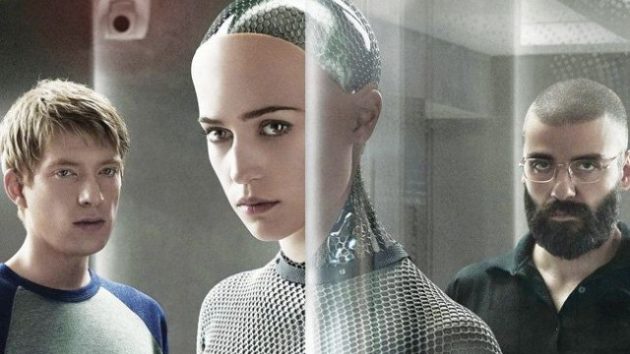Ex Machina: Consciousness without a Conscience
 I went to see producer Alex Garland’s movie Ex Machina. The film portrays a young computer programmer named Caleb employed by a company named Blue Book (any connection to Facebook?) being used to test the humanness of a robot name Ava played by Alicia Vilkander. Ava is the creation of Nathan the founder of Blue Book.
I went to see producer Alex Garland’s movie Ex Machina. The film portrays a young computer programmer named Caleb employed by a company named Blue Book (any connection to Facebook?) being used to test the humanness of a robot name Ava played by Alicia Vilkander. Ava is the creation of Nathan the founder of Blue Book.
Caleb is told he won a lottery to be the guest of Nathan for a week at his remote estate. However, the real purpose of Caleb’s visit is to evaluate Nathan’s artificial intelligence creation Ava. Nathan reveals to Caleb he was selected to conduct a Turing Test on Ava. The Turing Test is a test of a machine’s ability to exhibit intelligent behavior equivalent to, or indistinguishable from, that of a human.
What struck me about Ex Machina is how each of the three main characters (Nathan, Caleb and Ava) lie and conspire against one another to fulfill their desires. Nathan lies to Caleb about how he was chosen and why he is at Nathan’s remote laboratory. Caleb lies to Nathan and conspires to release Ava into the world believing the robot is worthy of its freedom. Ava lies to Caleb in order to gain his trust to free it from the laboratory in which it is being held.
This film is disturbing because is shows how humans without a conscience (morality) can, when given the chance, pass along their lack of morality to a machine.
Other writers have looked at this film as an example of how innovation drives the free markets. Richard N. Lorenc, the Chief Operating Officer of the Foundation for Economic Education, writes:
Last weekend, I saw Ex Machina, the new sci-fi thriller depicting the intentional emergence of artificial intelligence through the creative powers of human genius.
Ex Machina also demonstrates one of the most fundamental concepts of economics: How individuals alone can choose to act.
[ … ]
Ex Machina is not only a thriller, but also a lesson in the pervasiveness of economics in everything we do. If economics is the science of human action and only individuals can choose to act, then economics is all around us.
When you recognize that, you will marvel at how utterly improbable the wealth of the world around us actually is, as well as understand how easy it is to disrupt the entire system through reducing, restricting, or abolishing the individual’s prerogative to be the actor and hero of her own life.
My questions to Richard are: What is the social redeeming value of the human actions in Ex Machina? What good is there in the technology exhibited by the robot Ava?
Ava has a consciousness but is without a conscience.
At the end of the movie Ava escapes from the laboratory. To achieve this escape she deceives Caleb and kills both Nathan, its creator, and Caleb. Perhaps the most telling scene in the film is at the end when Ava finds previous versions of itself and begins to take the skin off of a previous robot and puts the skin on itself to look more human.
You see for Ava being human is only skin deep. Ava lacks the conscience (morality) of a human. Nathan did not learn the lesson of Issac Asimov’s book “I Robot.” Machines are just that, machines. To believe otherwise is fool hardy at the least and deadly at the worst.
Humans must control their urges to use technology to become God, as Caleb points out to Nathan. Robots must never be allowed to act alone. Think of the film The Terminator. You see machines may have a goal but lack a soul.
RELATED ARTICLES:
Killer Robots Will Leave Humans ‘Utterly Defenseless’ Warns Professor
In ‘Tomorrowland,’ We Get a Glimpse of the Left’s Vision for the Future
‘World’s first’ robot kitchen cooks for visitors at CES Asia in Shanghai
Robot learns skills through trial and error, like you do
Robot Tongue Identifies The Correct Beer Every Time



Trackbacks & Pingbacks
[…] recently reviewed Alex Garland’s film Ex Machina. I […]
Comments are closed.